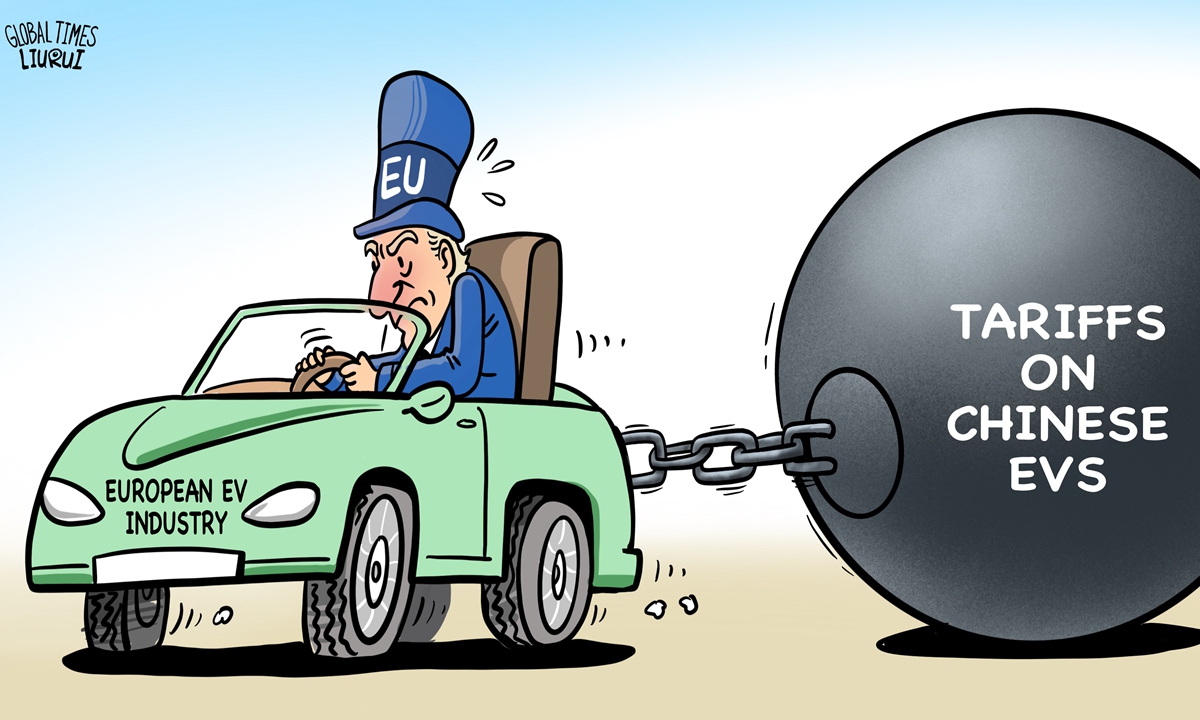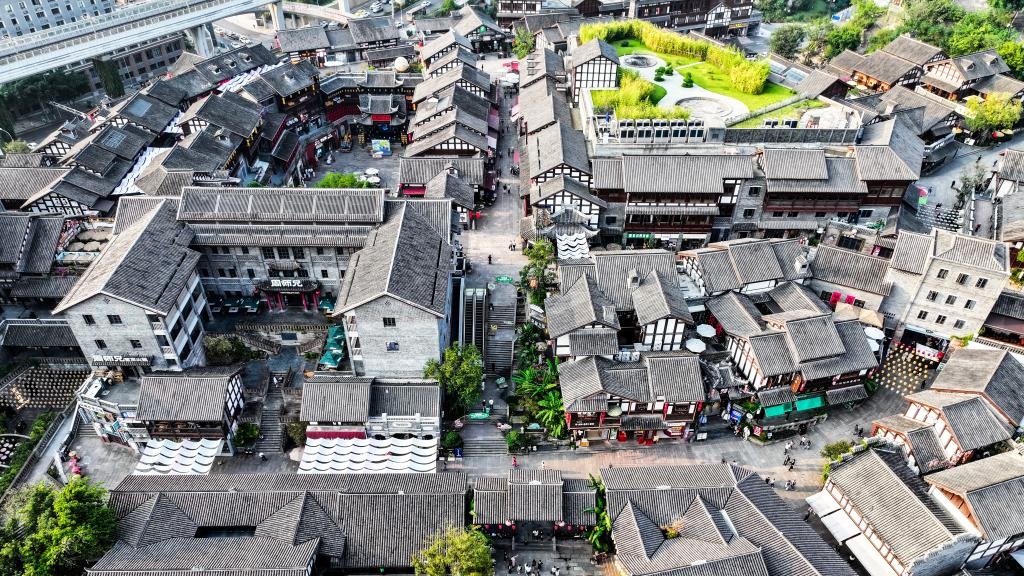Contrast between EU decision-making and Paris Motor Show is thought-provoking

Illustration: Liu Rui/GT
The 90th edition of the Paris Motor Show will be held from Monday to Sunday. It serves as a real window for observing trends in the global automobile industry. Despite the EU's decision to impose high anti-subsidy tariffs, many Chinese car companies, such as BYD, Hongqi and Leapmotor, are actively participating in the show with new products and new technologies. This contrast is thought-provoking. It demonstrates that protectionism has not shaken the determination of Chinese auto companies to explore the European market, nor can it stop the global auto industry's pursuit for cooperation and innovation.
The Paris Motor Show, which began in 1898, is the world's first automobile exhibition, and its influence in the industry is unquestionable. The organizers promote this auto show on their official website using the words "immersion, innovation, and passion," highlighting the value of "innovation" in the transformation of the global automobile industry. According to media reports, new-energy vehicles, such as electric vehicles, plug-in hybrid electric vehicles, and hydrogen fuel-cell vehicles, as well as intelligent vehicle technology that transforms cars from mere means of transportation into mobile intelligent terminals, will be the focus of this auto show. In addition to Chinese companies, nearly all exhibitors, including Renault and Peugeot from France, Volkswagen and BMW from Germany, Kia from South Korea, Ford and Tesla from the US, will showcase their unique innovation capabilities on this stage.
The active participation of "Intelligent Manufacturing in China" will add vibrant colors to the Paris Auto Show. At the last Paris Motor Show in 2022 and last year's Munich Auto Show, the showcases of China's new-energy vehicles demonstrated the growing strength of China's automobile industry.
It should be noted that the modern automobile industry has been around for more than 100 years. Compared to traditional automobile powers such as Europe, the US and Japan, China is just a latecomer still striving to catch up. Foreign cars and joint ventures have long dominated China's automobile consumption, while the share of Chinese new-energy vehicles in Western markets remains quite low. The performance of Chinese automobiles on the new-energy track in recent years has been impressive, but there is still a gap compared to traditional automobile powers in some key technologies and market share. The influx of Chinese car companies into the Paris Auto Show is essentially a gesture aimed at catching up and represents a desire to break through trade barriers. How can it be considered a "shock" or "threat"?
In this global "innovation race" within the automotive industry, Europe and the US have somewhat overreacted to competition from China. The emphasis on "innovation" at the Paris Motor Show indicates that countries, including France, are fully committed to researching effective strategies for upgrading the automotive industry. They understand that to protect their domestic markets and maintain the advantages of their national automotive sectors, they fundamentally need to rely on their own technological advancements. However, innovation is not a closed process; it requires the injection of energy from both competition and collaboration. In fact, the progress of China's automotive industry has been gradually achieved through open competition and cooperation with foreign brands. The open attitude toward Chinese companies at the Paris Motor Show at least demonstrates that communication and collaboration contribute to technological innovation, which has become a consensus in the international automotive industry. Moreover, achieving global emission reduction targets also relies on countries working together to strengthen and expand the green industry.
In this context, the European Commission's proposal to impose tariffs on Chinese electric vehicles contradicts the logic of industrial development and the realities of the European market. While the EU's tariff measures will inevitably pose challenges for Chinese automotive companies, they may also stimulate these companies to focus more on technological innovation and brand building, ultimately gaining global market recognition through higher-quality products and services. At the same time, European automakers are already facing transformation challenges. The imposition of tariffs will lead to increased costs for imported automotive parts, artificially creating a supply chain crisis and causing Europe to miss opportunities for technological innovation. The EU needs to reassess its development strategy for the automotive manufacturing industry; after all, in the face of strong intrinsic demand for cooperation and innovation in the automotive sector, trade protectionist barriers are lifeless.
The emphasis that Chinese car companies place on the Paris Motor Show reflects their focus on the European market. For Chinese enterprises aiming for global expansion, the European market is indispensable. Conversely, the importance that Chinese companies attach to the European market also underscores the value of that market itself. The dispute between China and Europe regarding the EU's anti-subsidy investigation into Chinese electric cars, if resolved through constructive dialogue, would be beneficial for Europe in the long run. According to reports, China and the EU have held consultation regarding the EV tariff issue for more than 20 days. So far, there are still major differences. China is sincere in the negotiations but has a firm attitude. Hopefully the EU will seize the communication opportunity and meet China halfway.
"When horses were replaced by cars, there was a lot of resistance." In the early days of the automobile, European countries even enacted laws requiring cars to yield to horse-drawn carriages. Today, the "horse-drawn carriage protection law" has become a historical joke; doesn't using protectionist measures to avoid competition resemble a 21st-century "horse-drawn carriage protection law"? Hopefully the EU will recognize this sooner rather than later. The automotive industries of China and Europe are highly complementary, and there are a solid foundation, ample space, and promising prospects for cooperation between the two sides. They should work together to create a win-win future.
Photos
Related Stories
- EU's "Draghi report" on competitiveness calls for investment in innovation, shared debt
- Von der Leyen pledges to speed up EU enlargement
- EU's "new trio" subsidy policies implemented in name of green transition
- EU tariffs trigger trade war concerns
- China files appeal to WTO over EU electric vehicle tariffs
Copyright © 2024 People's Daily Online. All Rights Reserved.









